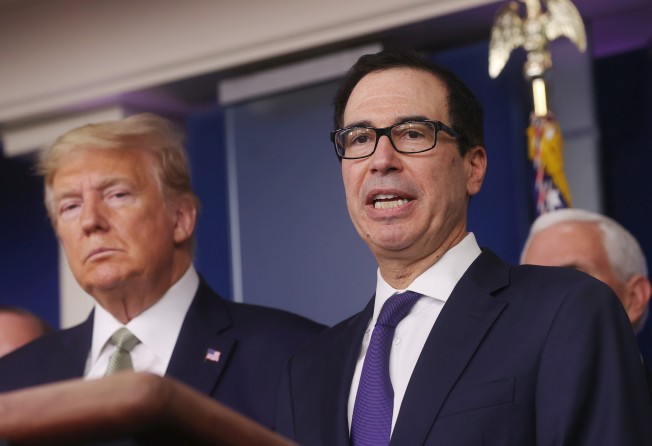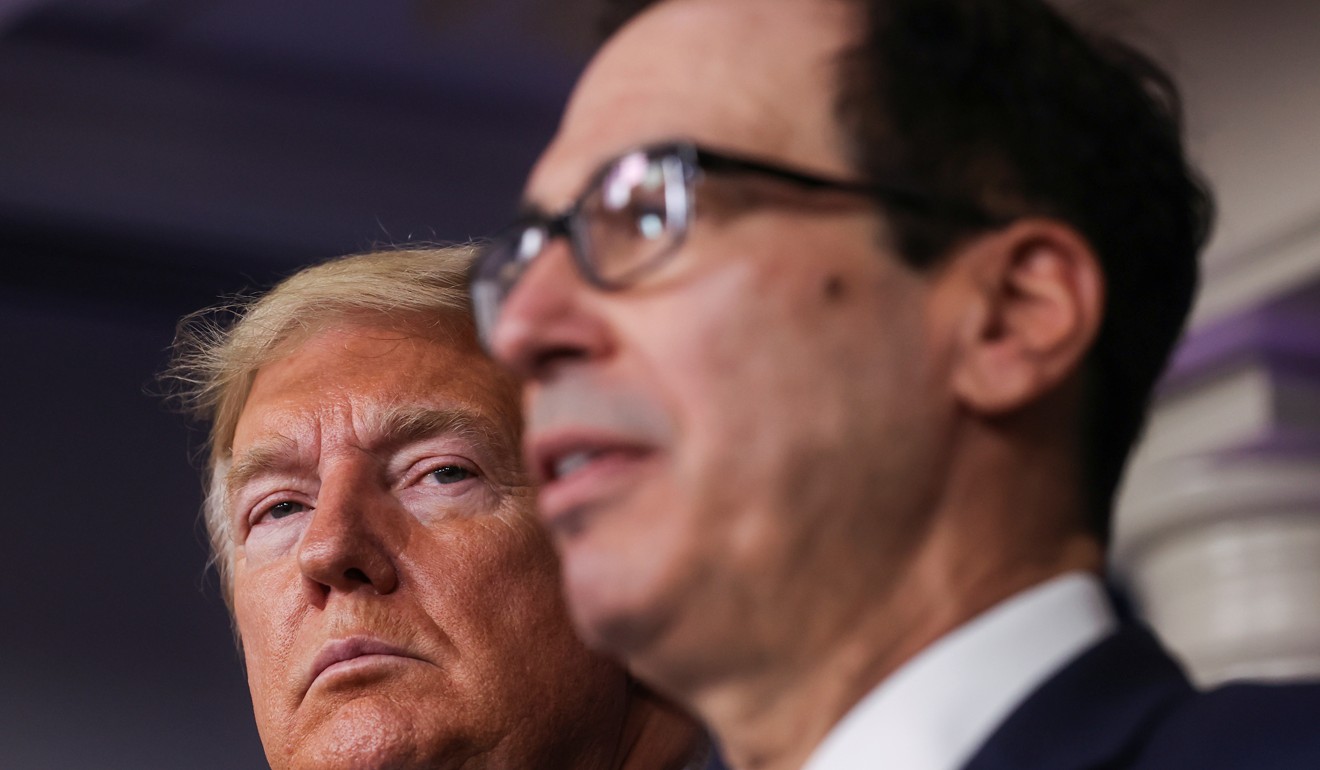Coronavirus: White House stimulus plan includes US$1,000 cash payments to Americans
- Cheques of US$1,000 to Americans are part of a Trump administration package reported to cost up to US$1 trillion
- Treasury Secretary Steven Mnuchin says plan also includes three-month deferral of tax payments by both individuals and businesses

The Trump administration said on Tuesday that it was proposing a US$1 trillion stimulus package to prop up the economy amid the coronavirus outbreak which includes cash payments to Americans.
In describing the proposal, which will be sent to Congress, Steven Mnuchin, the US Treasury Secretary, added that President Donald Trump hopes the measures would be rolled out “in the next two weeks”.
Speaking during the White House Covid-19 briefing and flanked by Trump and Vice-President Mike Pence, Mnuchin said the administration would also allow a 90-day, penalty-free deferral of tax payments of up to US$1 million for individuals and US$10 million for companies.
Following late-night talks with Trump on Monday, Mnuchin said at the briefing that he now had a stimulus proposal that he would first put to Senate Republicans. Mnuchin said he would also be holding talks with the leaders of the Democratic-controlled House of Representatives.
In the afternoon, Mnuchin told reporters on Capitol Hill that “we have put a proposal on the table that would inject US$1 trillion into the economy”.
Speaking after a meeting with Mnuchin, the Senate Republican leader Mitch McConnell said he was assembling Republican senators into three groups to write different segments of the stimulus bill at “warp speed”.
After that, he said he would sit down with Chuck Schumer, head of the Senate Democrats, to work out a bipartisan deal. Schumer earlier proposed an alternative US$750 billion stimulus package.
“We will stay here until we reach a bipartisan agreement and at least 60 votes to pass it,” McConnell said.
The package would help guarantee loans to small businesses and “critical industries” such as airlines and hotels.
“I think, as you know, this is worse than 9/11 for the airline industry,” Mnuchin said at the White House briefing. “We look forward to having bipartisan support … and we will be working with the Senate to pass this legislation.”
Trump described the proposal as a “very, very big, bold package”.
The briefing did not include specific breakouts on the package, but previous reports indicated that it could also include more than US$50 billion for the airline industry as well as US$250 billion for support of small businesses.
Regarding cash payments, Mnuchin said the administration was considering a direct transfer of US$1,000 to individual Americans but said that the figure could be higher after talks with Republicans.
“We are looking at sending cheques to Americans immediately … Americans need cash now and the president wants to get cash now. And I mean now, in the next two weeks,” he said.
Still, not every American taxpayer is likely to receive the cash. Mnuchin said it was “clear” that “we don’t need to send people who make a million dollars a year cheques.”
Mnuchin declined to give, either at the White House briefing or after speaking with Senate Republicans, a dollar figure for the cash transfer, saying only that “it’s a big number”.

But The New York Times, citing unnamed sources, reported that Mnuchin told senators about $250 billion of the stimulus plan would cover the cost of sending cheques to Americans.
Standing next to Mnuchin at the morning briefing, Trump said: “I think we’re going to do something that gets money to them as quickly as possible.”
The president had previously proposed a payroll tax holiday – possibly until the end of the year – as a way to help American workers during the crisis, but on Tuesday he acknowledged that implementing such a policy may take too long.
We absolutely believe in keeping the markets open … Americans need to know they have access to their money
“Payroll tax is one way, but it does come over a period of months, many months,” Trump said. “And we want to do something much faster than that. So I think we have ways of getting money out pretty quickly and very accurately.”
Mnuchin shot down speculation that the US was planning to temporarily suspend the stock market or cut trading hours. “We absolutely believe in keeping the markets open … Americans need to know they have access to their money,” he said.
He said that the treasury would pump US$10 billion into a Federal Reserve fund set up to buy up to US$1 trillion of commercial paper. The Fed’s action would help ease a liquidity crunch in the unsecured, short-term funding market – which is used as a short-term financing facility by large swathes of the economy.
Cuomo wants “all states to be treated the same.” But all states aren’t the same. Some are being hit hard by the Chinese Virus, some are being hit practically not at all. New York is a very big “hotspot”, West Virginia has, thus far, zero cases. Andrew, keep politics out of it....
— Donald J. Trump (@realDonaldTrump) March 17, 2020
The briefing came amid a dramatic turn in Trump’s stance concerning the coronavirus. After weeks of playing down the threat posed by the outbreak, the president on Monday struck a more sober tone, saying for the first time that he thought the situation was “bad”.
And, after feuding on Monday with New York Governor Andrew Cuomo – whose state has the most confirmed coronavirus cases in the country – Trump praised a phone call he had with the governor earlier on Tuesday.
Still, in a post on Twitter earlier Tuesday morning, he chastised Cuomo and said he should “keep politics out of it”.
In the absence of unified federal action on the outbreak, states are continuing to take increasingly aggressive moves to deal with it.
On Tuesday Maryland became the fifth state to postpone its primary election, as top health officials warned that citizens across the country need to “hunker down”, with stringent social distancing measures to flatten the epidemic curve. Trump on Monday advised the public to avoid social gatherings of more than 10 people.